Hamas members operated in Libya in the service of Qatar, extending aid to Qatar-backed jihadi organizations there, such as Ansar Al-Shar'ia,[1] which was responsible for the 2012 attack on the U.S. embassy in Benghazi, in which the ambassador and three other U.S. nationals were killed, and the Benghazi Revolutionaries Shura Council. [2] Libyan elements affiliated with Khalifa Haftar, head of the Libyan National Army (LNA), which is backed by the UAE and is fighting Islamist elements in eastern Libya, claim that the aim of the organizations backed by Qatar is to strengthen the Islamist rebels in Libya, increase the chaos there and help bring to power elements close to the Muslim Brotherhood, a movement which Qatar supports.
A Libyan court recently released four members of a Hamas cell who had been imprisoned for operating in the country with the help of Qatari and Turkish elements. The cell members were sentenced in 2019 to 18-22 years' imprisonment for forming a clandestine foreign organization, possessing arms, jeopardizing Libya's national security and smuggling weapons to Hamas in Gaza. After their release they were flown to Istanbul in a private plane,[3] and from there reportedly to Qatar.[4]
The Libyan elements close to Haftar claim that the cell, operating under the direction of Qatar, aided jihadi rebel organizations like Ansar Al-Shari'a and the Benghazi Revolutionaries Shura Council in their fight against Haftar's forces, by training them in warfare methods, including in the manufacture of explosive devices. The sources stress that these are not the only Hamas members who have been arrested in Libya on terror charges. Thirteen other Palestinian Hamas operatives, one of them a woman, were also arrested for aiding Islamist groups fighting Haftar's LNA. At a June 2017 press conference, LNA spokesperson Ahmad Al-Mismari said that Hamas' military wing, the Izz Al-Din Al-Qassam Brigades, "is involved in [the fighting] in Libya, under Qatar's management and with Qatari funding."[5]

Members of the Hamas cell being flown out of Libya in a private plane (Image: Telegram.me/gazaalannetz )
This report reviews the allegations regarding this Hamas cell in Libya and its ties to Qatar.
The Qatari Connection – Hamas' Al-Qassam Brigades Is Part Of A Qatari Terror Network In Libya
According to forces loyal to Khalifa Haftar, the head of the EAU-backed LNA, Qatar – which is one of the chief patrons of the Muslim Brotherhood, along with Turkey – used the chaos in Libya after the uprising against the Qadhafi regime to strengthen forces affiliated with the Muslim Brotherhood, with the aim of bringing them to power. It did so by funding Islamist rebel organizations and providing them with arms and military training, either directly, by means of Qatari military personnel, or indirectly, by means of operatives from Hamas' military wing, the Izz Al-Din Al-Qassam Brigades. At the aforementioned June 2017 press conference, LNA spokesperson Ahmad Al-Mismari said: "We are struggling with systematic terrorism orchestrated by foreign countries that have devised a plan and strategy to control Libya through political Islam or through terrorist groups and gangs in the country. Some [foreign] individuals and Libyans are conspiring to enable the enemy to take control of Libya. They empowered the enemy to destroy the resources of the Libyan people, assassinate thousands in Libya, and fight the LNA in the guise of ostensibly Libyan [groups] that, in reality, are not Libyan but are led by [elements] outside Libya… To see who is behind the terrorism in Libya and how terrorism was manufactured in Libya, we must examine some photos related to the State of Qatar.” [6]
Haftar's forces claim that Qatar has funded, armed and trained Islamist rebel forces, some of them linked to Al-Qaeda, such as the aforementioned Ansar Al-Shari'a and the Benghazi Revolutionaries Shura Council, as well as the Libyan Islamic Fighting Group, headed by Abdelhakim Belhaj, which is likewise fighting in Libya. These groups initially fought the Qadhafi regime and managed to take over major cities in the east of the country, including Benghazi, Misrata and Derna, and later turned to fight Khalifa Haftar's forces.
Qatar, for its part, has confirmed that it supplied the Benghazi rebels with munitions, including anti-tank weapons,[7] and Qatari military delegations have reportedly visited areas controlled by the rebels. In his June 2017 press conference, Mismari presented photographs showing Belhaj with Hamad bin Abdullah Al-Futais Al-Marri, who would later become the commander of the Qatari army's Joint Special Forces.[8] It has also been reported that Qatar funded Belhaj's Al-Naba television channel.[9] Belhaj himself expressed support for Qatar on several occasions, and praised it for supporting the revolution against the Qadhafi regime.[10] In 2017, apparently fleeing charges brought against him for suspected involvement in terrorist activity, including attacks on public facilities,[11] Belhaj left Libya for Qatar and stayed there for five years before returning to the country in 2022.[12]
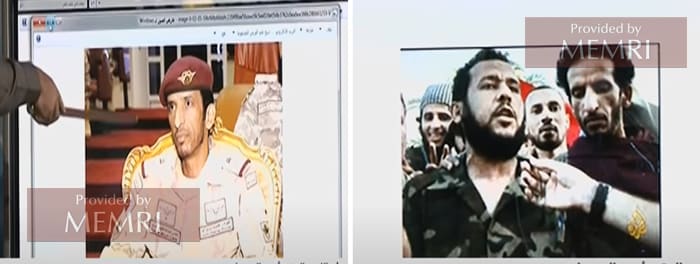
Left: Hamad bin Abdullah Al-Futais Al-Marri in Qatari military uniform; right: Futais with Abdelhakim Belhaj in Libya (Images: Skynewsarabia.com, June 8, 2017).
In addition to extending military support to Islamist rebel groups, Qatar has also supported elements close to the Muslim Brotherhood , such as Libya's Justice and Construction Party, headed by Muhammad Sawan. Sawan and his party reciprocated by siding with Qatar in its crisis with its Gulf neighbors (Saudi Arabia, the UAE and Bahrain) and Egypt in 2017-2021.[13] Furthermore, on April 11, 2018 the Emirati daily Al-Khalij published documents – allegedly leaked Qatari government documents that had been posted on social media – indicating that Qatar was providing the party with $250,000 every month.[14]
In 2017, as part of Qatar's crisis with its Gulf neighbors and Egypt, the latter countries published lists of terror organizations and operatives they claimed were linked to Qatar, including those active in Libya, such as Abdelhakim Belhaj.[15] A month later they added the Benghazi Revolutionaries Shura Council to the list, and issued a statement saying that this organization received "considerable support and financial [aid] from the Qatari authorities and played an active role in spreading chaos and destruction in Libya."[16]
On June 5, 2017, the website of Sky News Arabia posted an investigative article that reviewed the Libyan terror organizations backed by Qatar. The article claimed that, since the outbreak of the revolution against the Qadhafi regime in February 2011, Qatar had provided these groups with over 750 million euros, as well as weapons and gear, and soldiers to serve as bodyguards for Belhaj. It also held training courses in intelligence and military operations management for members of these organizations, including Ansar Al-Shari'a, and armed the Benghazi Revolutionaries Shura Council and operatives of the Libyan Islamic Fighting Group active in Derna.[17]
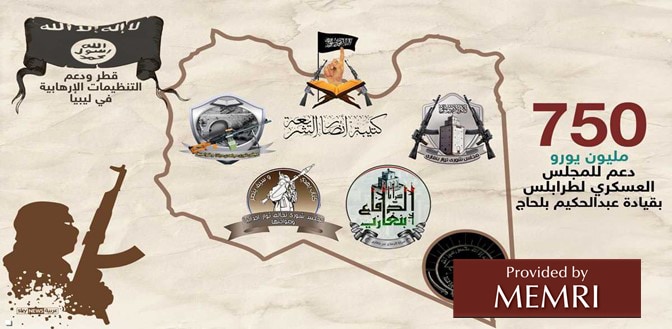
Infographic showing Qatar's support for terrorist organizations in Libya (Skynewsarabia.com, June 5, 2017)
As stated, as part of its support of the Islamist rebel forces in Libya, Qatar has reportedly also sponsored and funded activity in Libya by operatives of the Izz Al-Din Al-Qassam Brigades, the military wing of Hamas, which is another terror organization Qatar supports. In an interview with the London-based Saudi daily Al-Hayat, LNA spokesperson Mismari stressed that "Qatar sends Al-Qassam operatives and explosives experts to join the armed terror organizations in Libya, with the help of one of Egypt's neighbors [apparently Sudan], which covers for them as they pass from Gaza [to Libya through its territory]." He added that, in 2014, meetings were held in that country (i.e., Sudan), "attended by elements from Qatar and Iran, which discussed ways to provide material and logistical aid [to organizations in Libya], and send them Al-Qassam operatives and terror operatives from Syria… in order to create chaos in Libya and undermine its military infrastructure. [They also discussed how to] facilitate the passage of terrorists through Egypt and create chaos in Egypt."[18]
LNA Spokesman Ahmad Al-Mismari: Al-Qassam Manuals Were Found In Possession Of ISIS Operatives In Libya; Al-Qassam's Khan Younis Brigade Aided Libyan Terrorists
According to LNA elements, 17 Hamas-affiliated operatives were arrested in Libya before 2017 on suspicion of military cooperation with Islamist rebel organizations. One of them was a woman, who, according to Ashraf Al-Faidi, head of the investigation department at the Benghazi Security Directorate, "had links to Hamas" and was engaged in spying on the LNA for Hamas and other terror organizations. She was apprehended in Benghazi in 2017 while trying to inform these terror organizations about the location of LNA units.[19]
In the June 2017 press conference, LNA spokesman Mismari said that "Hamas military commanders trained extremist elements in Libya [to make and use] explosive devices and boobytraps." He specified that it was members of Al-Qassam's Khan Younis Brigade that had "helped terrorists in Libya."[20] He also claimed that "more than 100 manuals and hundreds of videos [produced by] the Al-Qassam Brigades had been found in the Ganfuda area in Benghazi."[21] One of the manuals, produced by Al-Qassam's Engineering Unit and titled "Technical Engineering of Explosives," was found in the possession of ISIS elements in the same area."[22]
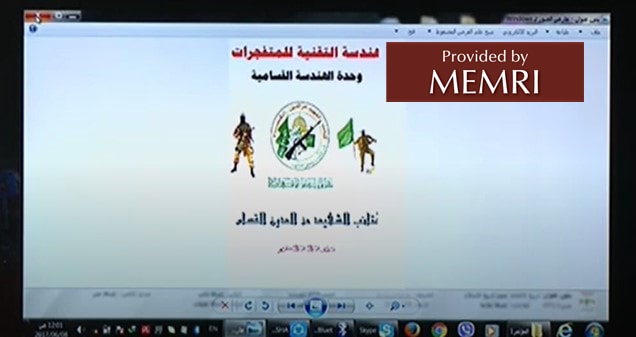
Manual titled "Technical Engineering of Explosives," produced by the Al-Qassam Brigade's Engineering Unit, found in the possession of ISIS elements in Benghazi (image: Skynewsarabia.com, June 8, 2023)
It should be mentioned that, according to the Egyptian Prosecutor-General's office, a similar booklet was found in the possession of an ISIS cell in Tanta.[23]

The booklet was found in the possession of an ISIS cell in Tanta (Al-Yawm Al-Sabi', Egypt, April 11, 2015)
Also in June 2017, the LNA navy's Special Forces announced that they had proof that Al-Qassam Brigade fighters were participating in battles in the city of Benghazi, and showed headbands with the Brigades emblem that they had found there.[24] In other words, according to Haftar's forces, Al-Qassam Brigades operatives fought alongside the Islamist rebel organizations against them in the city between 2014 and 2017.

Haftar forces hold headbands with the Al-Qassam Brigades emblem (Almarsad.co, June 10, 2017)
Libyan Security Forces: In Libya, A Hamas Cell Trained Qatar-Affiliated Jihadi Elements And Smuggled Weapons Into The Gaza Strip
One of the main Hamas cells captured in Libya is the aforementioned cell, four of whose members were arrested in Tripoli in October 2016 by forces loyal to LNA commander Haftar and recently released. The four are Hamas representative in Libya Marwan Abd Al-Qadr Al-Ashqar, his son Baraa, Mu'ayyid Jamal Abed, and Nasib Muhammad Shbeir. They were convicted of terror activity in Libya and collaboration with Libyan Islamist jihad organizations, chief of them Ansar Al-Shari'a – organizations which, as noted, had participated in the 2012 attack on the U.S. Embassy in Benghazi during which the ambassador and another three Americans were killed – and with the Benghazi Revolutionaries Shura Council, which, as noted, is suspected of being supported by Qatar.[25]
Al-Ashqar has a doctorate in environmental studies and owns a technological products company that served as a cover for his activity. Along with the three Hamas operatives – engineering students who were part-time employees at his company – he was accused of making explosive devices for those organizations and of spying on LNA forces.[26] According to Al-Siddiq Al-Sour, the head of the Tripoli prosecutor-general's investigations division, an examination of the squad members' computers showed that they had "exposed secrets concerning state security, violated Libyan sovereignty, and smuggled weapons into neighboring countries, in particular to Egypt." Al-Sour said that the operatives had previously lived in Benghazi and later settled in Tripoli.[27]
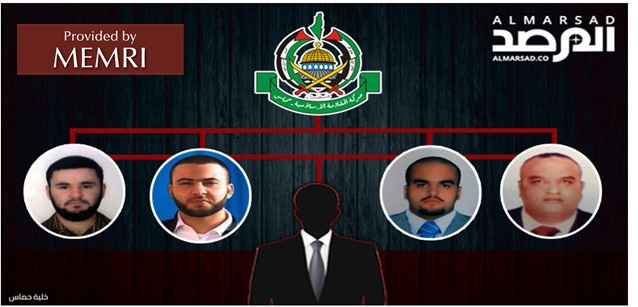
Hamas cell members, right to left: Marwan Al-Ashqar, his son Baraa, Mu'ayyid Jamal Abed, and Nasib Muhammad Shbeir (Source: Almarsad.co, February 28, 2019)
Investigation File: Direct Links To Senior Al-Qaeda And Ansar Al-Sharia Officials In Libya – For Guidance And Supplying Weapons
In January 2019, the Libyan daily Al-Marsad revealed parts of the investigation file of the cell members, including correspondence, documents concerning weapons purchases and smuggling, and videos documenting training for terror operations. The newspaper's report mentioned the names of two of the freed Hamas operatives, Nasib Shbeir and Marwan Al-Ashqar, and two additional Hamas operatives, Muhammad Al-Barash, deputy to Marwan Al-Ashqar, and Suleiman Al-Faq'awi.
According to the documents, the cell had begun operating in Benghazi, and in 2014 moved to Misrata, and from there to Tripoli. It engaged in planning tactical military activity, logistical matters, and terror activity, and even provided weapons to terror elements in several Libyan cities, including Benghazi and Derna, that were controlled by Islamist organizations such as Ansar Al-Sharia. The report added that the investigation file included documents showing direct coordination between cell members and senior Al-Qaeda and Ansar Al-Shari'a officials in Libya, including in training and guidance in warfare methods and making explosive devices.
The Al-Marsad report also said that the cell had recruited extremist Palestinian operatives in the Gaza Strip who were affiliated with Al-Qaeda, and that they had joined the Islamist rebels in Libya.[28] Additionally, it said, the cell had maintained contacts with Ansar Al-Shari'a officials and with the Benghazi Revolutionaries Shura Council, including Wissam bin Hamid, Ziyad Bal'am (aka Farid Muhammad Muhammad Bal'am), who had participated in the U.S. Embassy attack,[29] and Younes Alfaidi.[30]
Report: Hamas Representative In Libya Helped Smuggle Weapons From Libya To Gaza, With Help Of Elements In Qatar And Turkey
SUPPORT OUR WORK

A February 8, 2021 report by The Times of London sheds more light on the squad's activity. According to this report, the squad operated under the direction of the Hamas central leadership, and with the help of elements from Qatar and Turkey. It stated that Marwan Al-Ashqar operated first in eastern Libya, where jihadis had taken over the major cities Derna and Misrata, and that after their defeat he had gone to Tripoli, where he started a company as a cover for his activity.
It added that Marwan Al-Ashqar's mission was to transfer weapons from the battlefields of Libya through Egypt and via middlemen and Hamas operatives in Qatar and Turkey, including senior Hamas official 'Allam Bilal, who lived in both these countries.[31] Al-Ashqar received an email with coded instructions from the Hamas leadership, with, for example, "jacuzzi" code for heat-seeking missiles, and "elephant hunt" code for destroying tanks with missiles.
Al-Ashqar would place messages inside coded e-books that were sent to his handlers. According to The Times, the Tripoli authorities' suspicions were aroused by the frequent visits of armed men to the offices of Al-Ashqar's company.
The Times also reported that the Libyan indictment documents showed that Al-Ashqar had admitted that, at a meeting in 2011 in Gaza, attended also by then- Hamas prime minister Isma'il Haniya, he had been instructed to obtain weapons and given a Palestinian passport. He also admitted that he had sent rifles and explosives to Gaza via smugglers in Egypt, and that, because he had been asked to provide better quality weapons such as Stingers and Kornets, he had gone to Hamas military official 'Allam Bilal, who resided in Qatar and Turkey.[32]
Meetings And Money Transfers Among Officials Of Islamist Parties Linked To Muslim Brotherhood And Qatar
The investigation file of the cell, which was partially published by Al-Marsad in January 2019, showed that in addition to military activity, the cell had also operated at the political level, and had sought to tighten relations with the Muslim Brotherhood-affiliated Islamist parties that were closely linked to Qatar, such as the Justice and Construction Party headed by Muhammad Sawan, the Libyan branch of the Muslim brotherhood. The cell had maintained contacts also with the Homeland Party headed by Abdelhakim Belhaj, the head of the Libyan Islamic Fighting Group, until it disbanded in 2017.
According to the report in Al-Marsad, the investigation file of the Hamas cell, headed by Al-Ashqar, includes a document from the Hamas movement in Libya that provides details of the results of Al-Ashqar's visit to the offices of the Justice and Construction Party and the Homeland Party, and his meeting with Belhaj, during which it was agreed that they would strengthen ties. The report also stated that Al-Ashqar had proposed to Belhaj that he (Al-Ashqar) would establish a "security committee" to deal with the "security problems of the Palestinian community in Libya." In the document, Al-Ashqar criticized Hamas officials who, he contended, arrive in Libya and are in direct contact with "the Libyan leaders" rather than coordinating meetings through him.
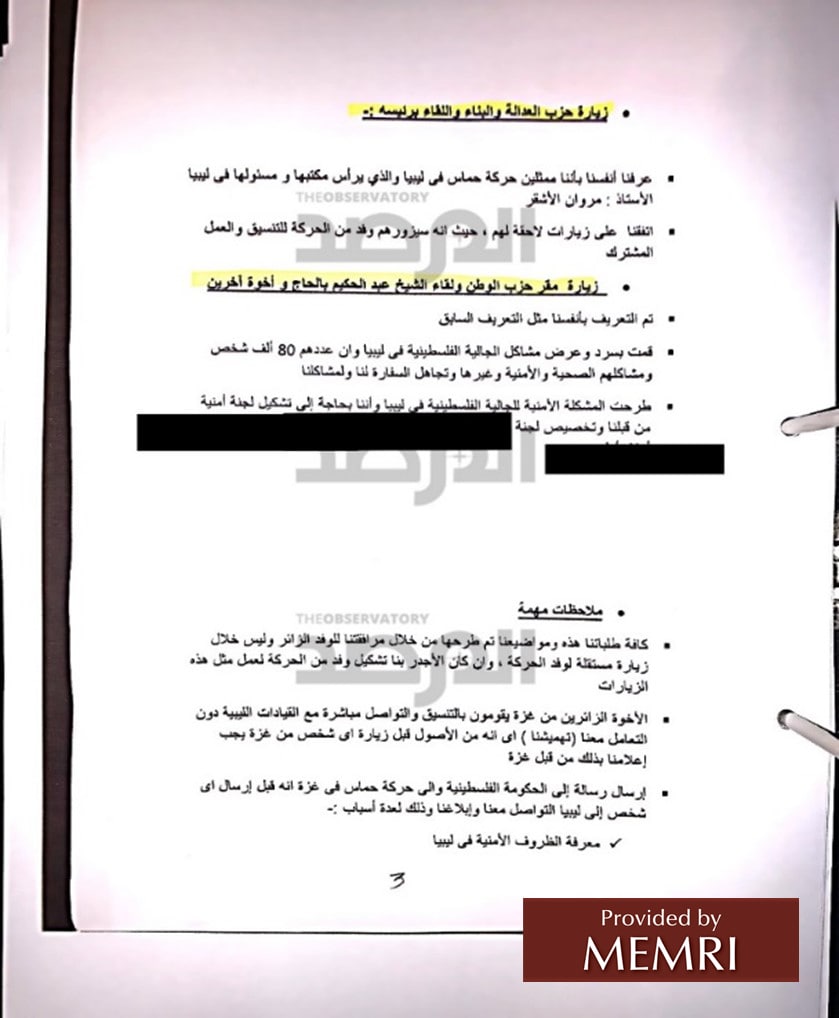
The investigation file also purportedly revealed that members of Hamas from Gaza – Islam Shahawan, spokesperson for the security apparatus in Gaza City and Adham Abu Salima, director of the Hamas Interior Ministry, were invited by Belhaj to visit Libya and a dinner was held for them to which members of the Tunisian Al-Nadha movement, which is also an arm of the Muslim Brotherhood, were invited as well.
There were also reports of the transfer of funds from Libya to Hamas. According to the report, Hamas and the Justice and Construction Party agreed to establish a contracting company that would bring Palestinian workers into Libya, and that half of the profits would be donated to orphans and the poor "while the designation of the second half is not known." Furthermore, the party organized a meeting with Libyan and Palestinian businesspeople during which, according to Hamas, funds were donated which were earmarked for charity in the Gaza Strip and were transferred "to Gaza in a manner that is not clear." The website noted that there is no legal mechanism for the transfer of funds from Libya to Palestine.[33]
UN Report: Palestinian Military Experts Are Present In Libya
The claims of the Libyan regime were confirmed by a report that was submitted to the UN Security Council in June 2017 by a panel of experts in Libya, at the request of the UN. While the report did not refer to Hamas by name, it confirmed "the presence of Palestinian military experts in Tripoli." According to the panel, "a Palestinian official" denied the existence of "any activity" in Libya, but confirmed that eight members of his organization, whose names were not provided, and "who are part of the Palestinian diaspora in Libya," were arrested in Tripoli during 2016.[34]
Senior Official In Qatar-Affiliated Libyan Islamist Faction Smuggles Weapons Into Gaza For Hamas
Despite Hamas denials,[35] there is evidence of an operational connection between the movement and Libyan jihadi elements, among them Ansar Al-Shari'a, primarily in the sphere of arms smuggling to the Gaza Strip.
Statements issued by Hamas members regarding the death of Wissam bin Hamid, the military commander of the Benghazi Revolutionaries Shura Council, reveal information about this connection as they note his contribution to the arming of Hamas and specifically the delivery of Kornet missiles from Libya to Gaza. A Libyan website reported that Ahmad Muhammad Shbeir, who is a Hamas official, described Bin Hamid as "a hero," who "sent weapons and ammunition to Palestine from the outbreak of the revolution in Libya on February 17, 2011 until a short time before his death as a martyr. He should be thanked... for the achievements and victories of the brothers in Gaza against the Zionists during the years 2012 to 2014."[36]
The "Al-Qassam Brigades" Telegram channel also lamented the death of Bin Hamid and praised his role in the arming of the Izz Al-Din Al-Qassam Brigades ever since the overthrow of Qadhafi. It stated that Bin Hamid "played a significant role in the victories and in the steadfastness of your brothers in the wars in Gaza from 2012 to 2014."[37]
Dr. Huthaifa Azzam, the son of Abdullah Azzam, who was the spiritual leader of Al-Qaeda founder Osama bin Laden, posted on his X account: "Even though he died as a martyr in Libya, Palestine and its people owe him an immense debt, since he gave the jihad fighters of Palestine what no country managed to give them. Wissam bin Hamid, hail your pure spirit."[38]
In September of that year Azzam was more explicit about the ties between Hamas and Bin Hamid: "Kornet [missiles] arrived in Gaza from Libya. May Allah have mercy on Wissam bin Hamid. Wissam paid with his life for transporting the Kornets seized from Qadhafi's warehouses to the Gaza Strip during the rule of President Morsi [in Egypt]..."[39]
The Libya Time, an online news outlet based in Tripoli, reported on April 13, 2018 with further evidence of such ties. One piece of evidence is a photo posted on Facebook by a user from Benghazi showing Hojen Al-Mehdawi, a member of the Benghazi Revolutionaries Shura Council, which is allegedly backed by Qatar, in the company of Al-Qassam Brigades operatives. The post stated this was a "a delegation of Benghazi rebels to Gaza", which transported "weapons to our brothers in Gaza." Another post showed Al-Mehdawi with Ismail Haniya as part of "a Caravan of Arab Spring Youth delegation" which visited Gaza.[40] The site also published photos released by Ansar Al-Shari'a in Benghazi showing members distributing donations to Gaza families in 2013.
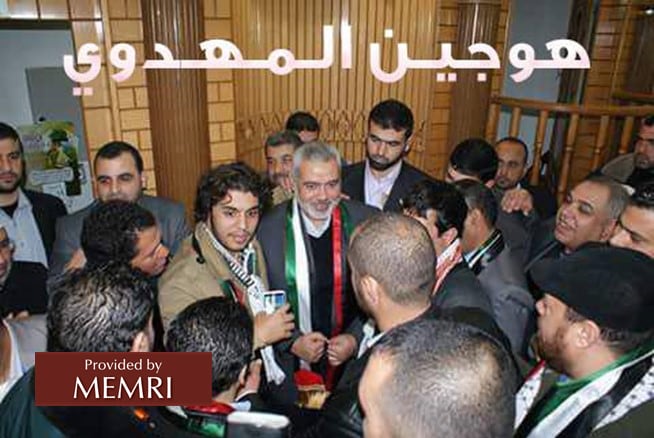
Al-Mehdawi with Haniya
The site added that Hamas has been paying a handsome sum to operatives in Libya to encourage them to form secret weapons-smuggling networks across the country. The weapons are smuggled from Libya to Egypt or North Sudan.[41]
[1] Ansar Al-Shari'a is an Islamist militia formed in 2011 following the uprising against the Qadhafi regime, which aims to establish Islamic rule Libya and fight foreign influences there, chiefly the American influence. At the height of its power the organization controlled large areas in eastern Libya, especially the cities of Benghazi and Derna. It has been designated as a terror organization by the U.S. and the UN Security Council, due to its ties with Al-Qaeda, among other reasons. In 2017 the organization announced its dissolution, apparently after suffering defeat at the hands of the Libyan National Army, headed by Khalifa Haftar (Aljazeera.com, November 20, 2014; dni.gov, accessed: December 6, 2023).
[2] The Benghazi Revolutionaries Shura Council is an umbrella organization comprising Salafi-jihadi groups, including Ansar Al-Sharia, and groups affiliated with the Muslim Brotherhood. It was founded in 2014 in response to the anti-Islamist campaign headed by Khalifa Haftar and the defeat of the Islamists in Libya's 2017 parliamentary election. In 2017 Egypt, Libya, the UAE and Bahrain designated it as a terrorist organization and claimed that it was heavily funded by Qatar. See MEMRI JTTM report, Changing Dynamics In The Global Jihad Movement (3): The Growing Presence Of ISIS In Libya, January 29, 2015.
[3] See MEMRI JTTM report: Pro-Hamas Media Outlet Claims Libya Released Four Hamas Members Charged With Smuggling Weapons Into Gaza; Russia's RT Arabic Claims Turkey Brokered Their Release, December 1, 2023.
[4] Arabnews.com, December 2, 2023. Huda Al-Saleh, a reporter for the Saudi Al-Arabiya channel, likewise claimed that the cell members had continued from Turkey to Qatar. Twitter.com/huda_1alsaleh, December 2, 2023.
[5] Alarab.new, February 10, 2017.
[6] Youtube.com/watch?v=wQ1et1Hx6JI&t=4s, June 22, 2017.
[7] Theguardian.com, April 14, 2023.
[8] Skynewsarabia.com, June 8, 2017.
[9] Al-Arabiya.net, January 16, 2019.
[10] Al-Sharq (Qatar), November 6, 2018.
[11] Al-Arabiya.net, January 16, 2019.
[12] Libyaupdate.com, April 23, 2023.
[13] In August 2017, for example, Sawan criticized clerics and official religious institutions for their silence in the face of the attack on Qatar (Al-Jazeera.net, August 1, 2017).
[14] Alkhaleej.ae, April 11, 2018.
[15] Thenationalnews.com, June 9, 2017.
[16] Okaz (Saudi Arabia), July 25, 2017.
[17] Skynewsarabia.com, June 5, 2017.
[18] Al-Hayat (London), July 1, 2017.
In August 2017, for example, Sawan criticized clerics and official religious institutions for their silence in the face of the attack on Qatar (Aljazeera.net, August 1, 2017).
[19] Al-Sharq Al-Awsat (London), January 8, 2017.
[20] Babnet.net, June 8, 2017.
[21] Alarab.news, February 10, 2017.
[22] Skynewsarabia.com, June 8, 2023.
[23] Al-Yawm Al-Sabi' (Egypt), April 11, 2015.
[24] Almarsad.co, June 10, 2017.
[25] Thenationalnews.com, June 9, 2017.
[26] Arabi21.com, December 12, 2023.
[27] Al-Quds Al-Arabi (London), September 29, 2017.
[28] Almarsad.co. January 4, 2019.
[29] Theatlasnews.co, July 16, 2023.
[30] Almarsad.co, January 4, 2019.
[31] The Times (London), February 8, 2021.
[32] The Times (London), February 8, 2021.
[33] Almarsad.co. January 4, 8, 2019.
[34] Refworld.org, June 1, 2017.
[35] Hamas, for its part, denied the reports regarding the cell members, claiming that the reports were part of a campaign against it aimed at undermining its credibility and the popular support it enjoys. The movement stressed that its permanent policy "is not to interfere in the affairs of any other country, Arab or otherwise," since its activity is focused on Palestine. Al-Quds Al-Arabi (London), September 29, 2017.
[36] Akhbarlibya24.net, February 23, 2019.
[37] See MEMRI JTTM report, "Telegram Channel Supporting Hamas Military Wing: Wissam Bin Hamid, Commander Of A Libyan Organization Connected To AlQaeda, Helped To Arm Hamas," May 8, 2018.
[38] Twitter.com/huthaifaabdulah, February 22, 2019.
[39] Twitter.com/huthaifaabdulah, September 2, 2019.
[40] Facebook.com/HojenAmehdawi, July 21, 2016.
[41] The Libya Time, April 13, 2018.




